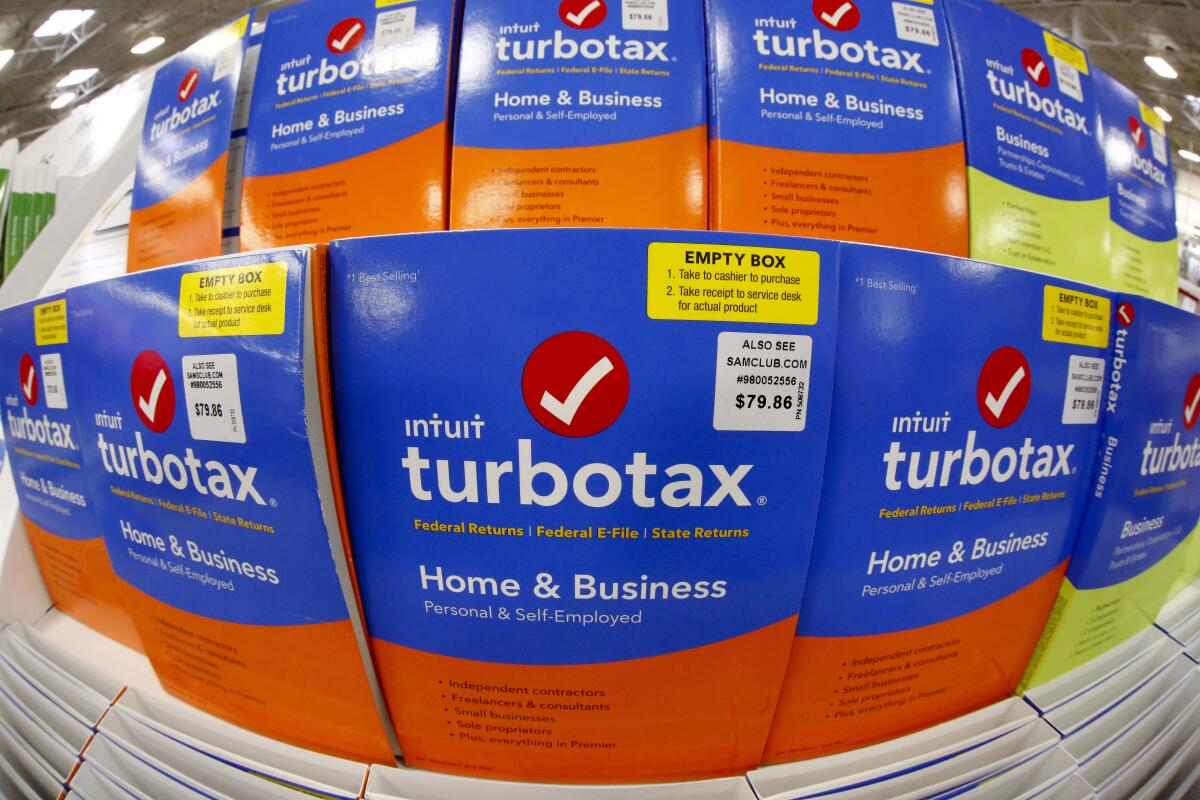How to file your taxes for free online

- Share via
Taxes may be one of life’s certainties. But paying to pay them isn’t.
In many other countries, the government does the math for you and tells you how much to pay, at no cost to you (beyond the taxes you are paying in the first place). In America, the Internal Revenue Service asks you to guess how much to pay, then punishes you if you are wrong. You also have the option to pay third-party companies for software that helps you make a better guess at the number that the IRS could calculate on its own.
The United States’ onerous tax code is thanks in no small part to companies that profit when you use their software or services to file. In 2019, ProPublica chronicled TurboTax maker Intuit’s long effort to separate taxpayers from a bit more of their money. H&R Block has also spent millions of dollars on lobbying to maintain the status quo.
California had a plan for the government to do your taxes for you. Tax software firms led by Intuit worked to kill it. Why it’s getting another look in Washington.
At the turn of the millennium, Intuit and similar companies were staring down an existential threat: the possibility that the government would create a tax-filing system that most Americans could use for free.
Instead of letting that happen, a compromise was reached. The Free File Alliance, a coalition of tax-filing software companies that would each offer a free version in partnership with the IRS, was born. Members of the Free File Alliance are required to offer a tax filing solution that could serve 60% of taxpayers, but can limit that by factors such as income, state and age.
Intuit made its version of Free File impossible to Google.
According to another report from ProPublica, although 70% of Americans are eligible to use one of the Free File Alliance’s offerings to file taxes, over the course of 16 years only 3% used the program.
In 2019, ProPublica updated its article to note that Intuit had un-hidden the site from Google searches. But we’ll make the free options even easier for you to find. If you are in a particularly complex tax scenario, sure, you probably need to pay a tax pro or at least shell out for an upgraded version of filing software. But if you meet certain parameters, you’ve got more options. Here are sites you can use to file your taxes for free.
The IRS website lists the Free File Alliance websites that let you you file taxes for free and lists the eligibility criteria for each. Read those criteria very closely before you break out your W-2s: All those websites require an adjusted gross income of $72,00 or less. (The free TurboTax version supports only people who made as much as $39,000.) Some do not support filing state income tax returns, or do in only certain states. Some have age limits.
H&R Block left the Free File Alliance last year, but it still offers a free version with potential upsells. The free version is not limited by age or income, though certain tax scenarios require you to upgrade to a paid version. U.S. News & World Report said the level of assistance offered is similar to TurboTax, but that H&R Block’s free version offers support for slightly more complex returns, such as ones with student loan interest and unemployment income.
Another alternative exists: CreditKarma, which is also not part of the Free File Alliance, offers free tax filing and does not limit it by income or age. There is no “upsell” version CreditKarma will try to entice you to buy. But CreditKarma does not support all tax scenarios: Either your tax situation qualifies or it doesn’t.
You have to sign up for a free CreditKarma account to use it. You can file state taxes for free if you do the federal taxes through CreditKarma, but the reverse is not true — you can’t do only your state taxes here. CreditKarma supports state taxes for 40 states and the District of Columbia.
- Here’s the page to get started filing taxes for free with CreditKarma.
- Here’s the list of tax forms supported by CreditKarma.
- Here’s the list of tax situations and forms not supported by CreditKarma, including if you’re filing from multiple states, if you earned income in a state where you are not a resident, if you resided in New York City or Yonkers, N.Y., during part of the tax year or if you reside in Puerto Rico.
In U.S. News & World Report’s analysis comparing CreditKarma with other tax software, it notes that CreditKarma is a bit less intuitive than free-but-with-an-upsell options such as TurboTax. The full software comparison and analysis is available here. Business Insider also put the software head to head.
If you feel confident you can do your taxes with no guidance whatsoever, the IRS has a site where you can find and fill out federal tax forms electronically.
If you make $57,000 or less in gross income, are at least 60 years old, have a disability or have limited English skills, you may qualify for the IRS’ Volunteer Income Tax Assistance or the Tax Counseling for the Elderly programs. Some of those services may be limited due to the COVID-19 pandemic.
This year — with unemployment benefits, home-office expenses, adult children moving back in and COVID medical bills — your taxes might be more complicated than ever. My colleague Rachel Schnalzer details some things you should consider.
The due date is May 17, 2021. Happy filing!
More to Read
Inside the business of entertainment
The Wide Shot brings you news, analysis and insights on everything from streaming wars to production — and what it all means for the future.
You may occasionally receive promotional content from the Los Angeles Times.











